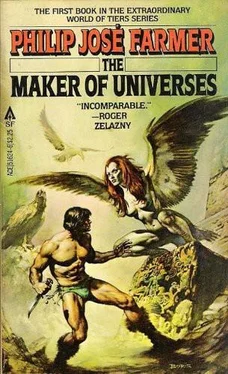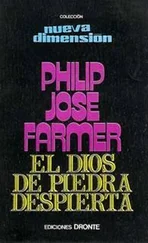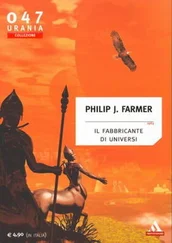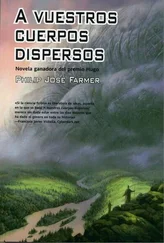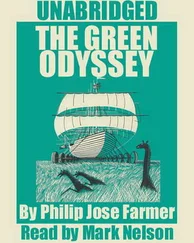He waved a hand at the soldiers, who moved forward, their spears leveled. “Never mind. If you see the woman, you will see her from the end of a chain.”
Kickaha sputtered indignantly. “We are subjects of the king of Khamshem and free men! You cannot do this to us! It will cost you your head, after certain legal tortures, of course!”
Abiru smiled. “I do not intend to take you back to Khamshem, friend. We are going to Teutonia, where you will bring a good price, being a strong man, albeit too talkative. However, we can take care of that by slicing off your tongue.”
The scimitars of the two men were removed along with the bag. Herded by the spears, they moved to the end of the line, immediately behind the gworl, and were secured with iron collars. Abiru, dumping the contents of the bag on the floor, swore as he saw the pile of jewels.
“So, you did find something in the lost cities? How fortunate for us. I’m almost—but not quite—tempted to release you for having enriched me so.”
“How corny can you get?” Kickaha muttered in English. “He talks like a grade-B movie villain. Damn him! If I get the chance, I’ll cut out more than his tongue.”
Abiru, happy with his riches, left. Wolff examined the chain attached to the collar. It was made of small links. He might be able to break it if the iron was not too high a quality. On Earth, he had amused himself, secretly of course, by snapping just such chains. But he could not try until nightfall.
Behind Wolff, Kickaha whispered, “The gworl won’t recognize us in this get-up, so let’s leave it that way.”
“What about the horn?” Wolff said.
Kickaha, speaking the early Middle High German form of Teutonic, tried to engage the gworl in conversation. After narrowly missing getting hit in the face with a gob of saliva, he quit. He did manage to talk to one of the Sholkin soldiers and some of the human slaves. From them he gleaned much information.
The gworl had been passengers on the Qaqiirzhub, captained by one Rakhhamen. Putting in at this city, the captain had met Abiru and invited him aboard for a cup of wine. That night—in fact, the night before Wolff had entered the city—Abiru and his men had seized the boat. During the struggle, the captain and several of his sailors had been slain. The rest were now in the chain-line. The boat had been sent on down the river and up a tributary with a crew to be sold to a river-pirate of whom Abiru had heard.
As for the horn, none of the crew of the Qaqiizhub had heard of it. Nor would the soldier supply any news. Kickaha told Wolff that he did not think that Abiru was likely to let anybody else learn about it. He must recognize it, for everybody had heard of the horn of the Lord. It was part of the universal religion and described in the various sacred literatures.
Night came. Soldiers entered with torches and food for the slaves. After meal time, two Sholkin remained within the chamber and an unknown number stood guard outside. The sanitary arrangements were abominable; the odor became stifling. Apparently Abiru did not care about observing the proprieties as laid down by the Lord. However, some of the more religious Sholkin must have complained, for several Dholinz entered and cleaned up. Water in buckets was dashed over each slave, and several buckets were left for drinking. The gworl howled when the water struck them and complained and cursed for a long time afterwards. Kickaha added to Wolff’s store of information by telling him that the gworl, like the kangaroo rat and other desert animals of Earth, did not have to drink water. They had a biological device, similar to the arid-dwellers, which oxidized their fat into the hydrogen oxide required.
The moon came up. The slaves lay on the floor or leaned against the wall and slept. Kickaha and Wolff pretended to do likewise. When the moon had come around into position so that it could be seen through the doorway, Wolff said, “I’m going to try to break the chains. If I don’t have time to break yours, we’ll have to do a Siamese twin act.”
“Let’s go,” Kickaha whispered back.
The length of the chain between each collar was about six feet. Wolff slowly inched his way toward the nearest gworl to give himself enough slack. Kickaha crept along with him. The journey took about fifteen minutes, for they did not want the two sentinels in the chamber to become aware of their progress. Then Wolff, his back turned to the guards, took the chain in his two hands. He pulled and felt the links hold fast. Slow tension would not do the job. So, a quick jerk. The links broke with a noise.
The two Sholkin, who had been talking loudly and laughing to keep each other awake, stopped. Wolff did not dare to turn over to look at them. He waited while the Sholkin discussed the possible origin of the sound. Apparently it did not occur to them that it could be the chain parting. They spent some time holding the torches high and peering up toward the ceiling. One made a joke, the other laughed, and they resumed their conversation.
“Want to try for two?” Kickaha said.
“I hate to, but we’ll be handicapped if I don’t,” Wolff said.
He had to wait a awhile, for the gworl to whom he had been attached had been awakened by the breaking. He lifted his head and muttered something in his file-against-steel speech. Wolff began sweating even more heavily. If the gworl sat up or tried to stand up, his motion would reveal the damage.
After a heart-piercing minute, the gworl settled back down and soon was snoring again. Wolff relaxed a little. He even grinned tightly, for the gworl’s actions had given him an idea.
“Crawl up toward me as if you wanted to warm yourself against me,” Wolff said softly.
“You kidding?” Kickaha whispered back. “I feel as if I’m in a steam bath. But okay. Here goes.”
He inched forward until his head was opposite Wolff’s knees.
“When I snap the chain, don’t go into action,” Wolff said. “I have an idea for bringing the guards over here without alarming those outside.”
“I hope they don’t change guards just as we’re starting to operate,” Kickaha said.
“Pray to the Lord,” Wolff replied. “Earth’s.”
“He helps him who helps himself,” Kickaha said.
Wolff jerked with all his strength; the links parted with a noise. This time, the guards stopped talking and the gworl rose up abruptly. Wolff bit down hard on the toe of the gworl. The creature did not cry out but grunted and started to rise. One of the guards ordered him to remain seated, and both started toward him. The gworl did not understand the language. He did understand the tone of voice, and the spear waved at him. He lifted his foot and began to rub it, meanwhile grating curses at Wolff.
The torches became brighter as the feet of the guards scraped against the stone exposed beneath the loose dirt. Wolff said, “Now!”
He and Kickaha arose simultaneously, whirled, and were facing the surprised Sholkin. A spearhead was within Wolff’s reach. His hand slid along it, grasped the shaft just behind the point, and jerked. The guard opened his mouth to yell, but it snapped shut as the lifted butt of the spear cracked against his jaw.
Kickaha had not been so fortunate. The Sholkin stepped back and raised his spear to throw it. Kickaha went at him as a tackier after the man with the ball; he came in low, rolled, and the spear clanged against the wall.
By then, the silence was gone. One guard started to yell. The gworl picked up the weapon that had fallen by his side and threw it. The head drove into the exposed neck of the guard, and the point came out through the back of the neck.
Kickaha jerked the spearhead loose, drew the dead guard’s knife from his scabbard, and flipped it. The first Sholkin to enter from outside received it to the hilt in his solar plexus. Seeing him go down, others who had been so eager to follow him withdrew. Wolff took the knife from the other corpse, shoved it into his sash, and said, “Where do we go from here?”
Читать дальше
